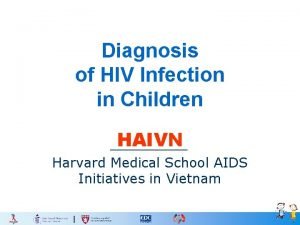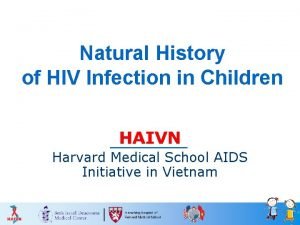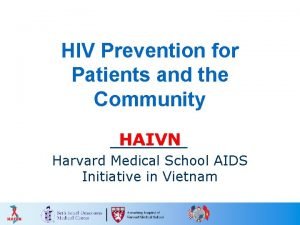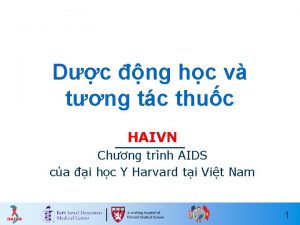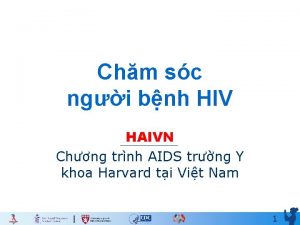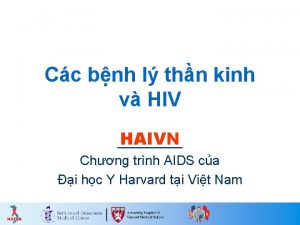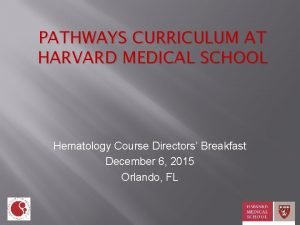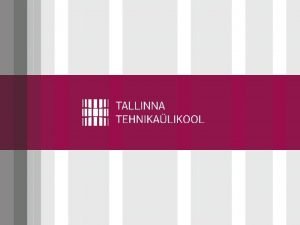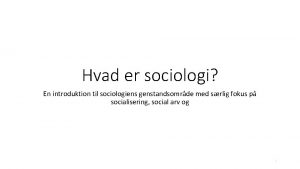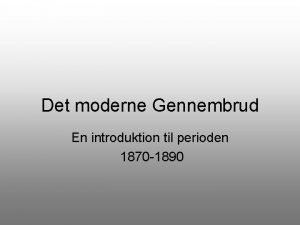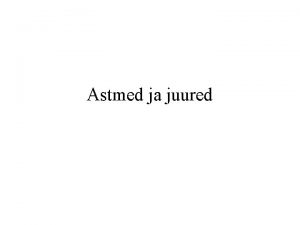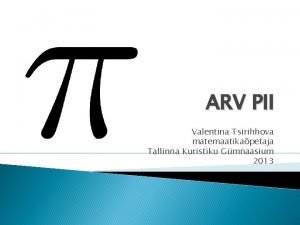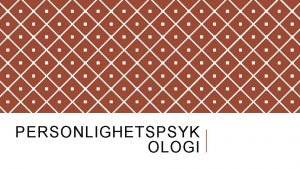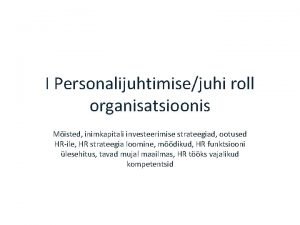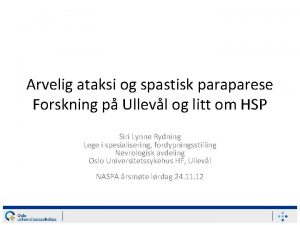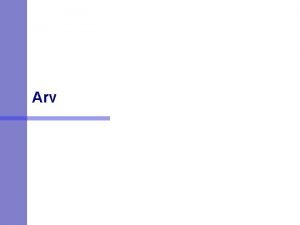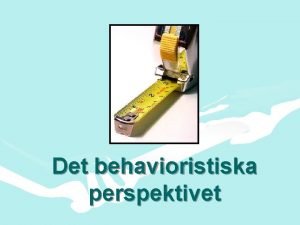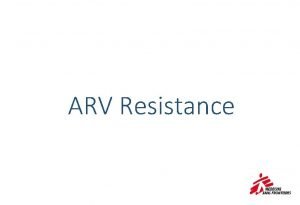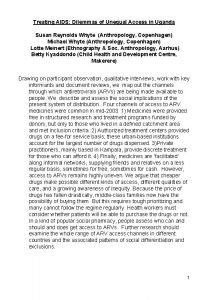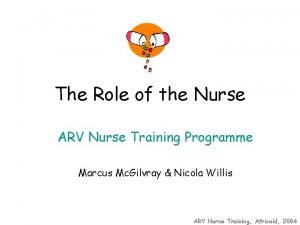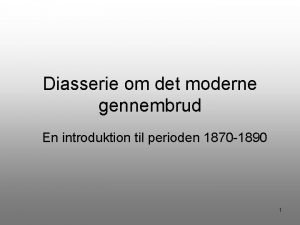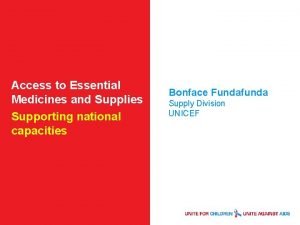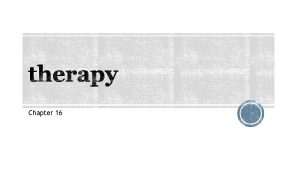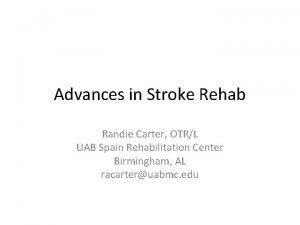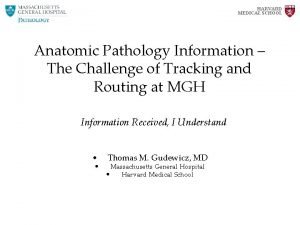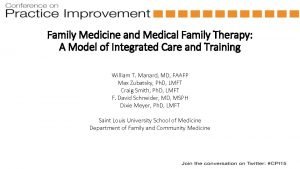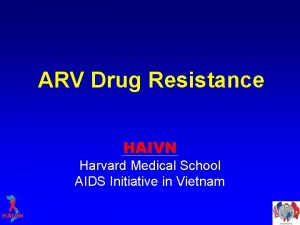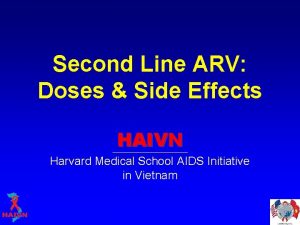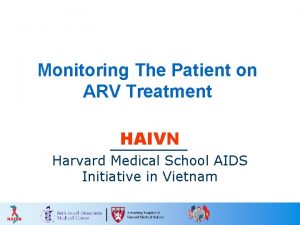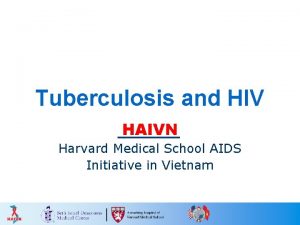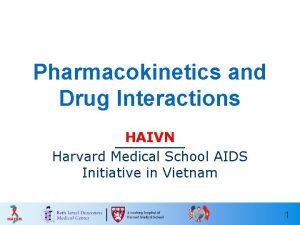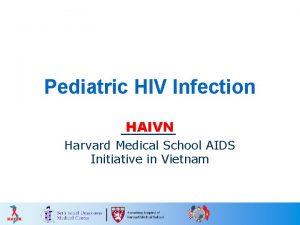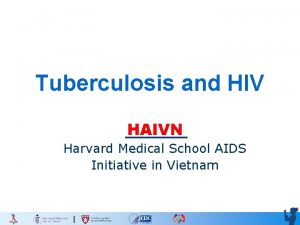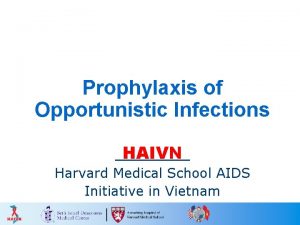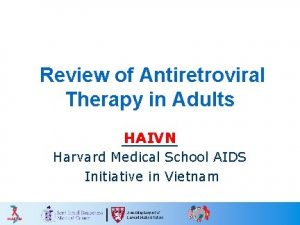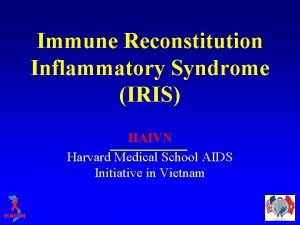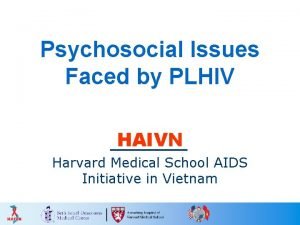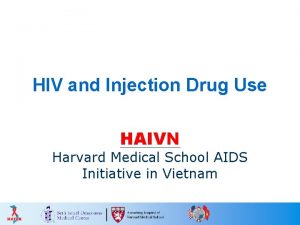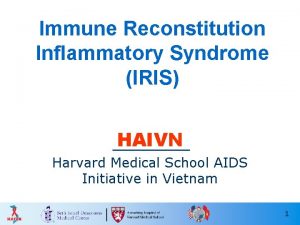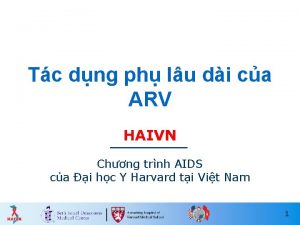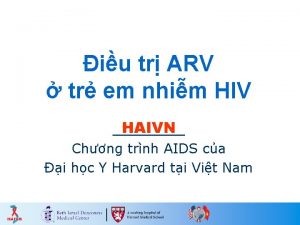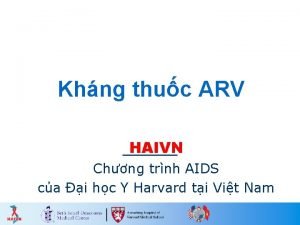Introduction to ARV Therapy HAIVN Harvard Medical School



































- Slides: 35

Introduction to ARV Therapy HAIVN Harvard Medical School AIDS Initiative in Vietnam

Learning Objectives By the end of this session, participants should be able to: n Identify the main classes of ARV drugs available in Vietnam and explain their mechanisms of action n Explain the criteria for starting ART n Identify the first line ARV regimens 2

ARV Drug Classes

Drug Classes of Antiretrovirals 1. Nucleoside Reverse Transcriptase Inhibitors (NRTI) 2. Non-nucleoside Reverse Transcriptase Inhibitors (NNRTI) 3. Protease Inhibitors (PI) 4. Fusion/Entry Inhibitors 5. Integrase Inhibitors 4

ARV Drugs Currently Available in the World and Vietnam Nucleoside/ Nucleotide RTI Nonnucleoside RTI Protease inhibitors AZT / Zidovudine NVP /Nevirapine SQV / Saquinavir d 4 T / Stavudine DLV / Delavirdine 3 TC / Lamivudine dd. I / didanosine ABC / Abacavir Integrase inhibitors RAL / Raltegravir IDV / Indinavir EFV / Efavirenz NFV / Nelfinavir ETR / Etravirine APV / Amprenavir LPVr / Lopinavir + ritonavir TDF / Tenofovir FTC /Emtricitabine RTV / Ritonavir Fusion/Entry inhibitors ATV / Atazanavir MVC / Mariviroc DRV / Darunavir ENF / Enfuvirtide TPV / Tipranavir 5 Fos-Amprenavir

Combination Pills Available in Vietnam AZT + 3 TC = D 4 T + 3 TC + NVP = LAMZIDIVIR, Combivir D 4 T - FDC, NEVITRIO 30, Triamune, GPOvir AZT + 3 TC + NVP = AZT - FDC, LAMZITRIO AZT + 3 TC + ABC = ABATRIO, Trizivir 6

Review of HIV Lifecycle HIV is an RNA “retrovirus” n Virus containing RNA infects the cell n Viral enzymes transcribe RNA to DNA (reverse transcription) n Viral DNA is integrated into the host cell DNA n Cell and viral mechanisms produce viral proteins and viral RNA n New virus is produced 7

HIV Lifecycle and ARV Fusion/Entry Inhibitors Protease Inhibitors (PI) Reverse Transcriptase Inhibitors (NRTI + NNRTI) Integration Inhibitors 8 Source: wires. wiley. com-2010

Nucleoside Reverse Transcriptase Inhibitors (NRTI) n n Reverse transcriptase (RT) builds DNA from viral RNA by using human nucleotides NRTI drugs, when present, will be inserted into the growing DNA chain containing NRTIs cannot accept new nucleotides This blocks DNA chain production so HIV cannot produce new virus to infect new cells 9

Non-Nucleoside Reverse Transcriptase Inhibitors (NNRTI) n n NNRTIs attach directly to the reverse transcriptase enzyme. Enzyme with NNRTI attached cannot function normally Production of viral DNA from RNA is blocked Virus is unable to convert RNA into DNA, therefore unable to infect the cell and produce new virus 10

Site of Action of RTIs Reverse Transcriptase Inhibitors (NRTI + NNRTI) 11 Source: wires. wiley. com-2010

Mechanism of Action of NRTIs and NNRTIs Source: Nature 2001 Nature, 2001 Source: 12

Protease Inhibitors (PI) n n Infected cell produces large viral proteins (polyproteins) Protease enzyme cleaves polyproteins into enzymes and structural proteins required to make new virus PIs attach to and block protease enzyme The virus particles produced are defective and inactive and are unable to infect new cells 13

Site of Action on Protease Inhibitors (PI) 14 Source: wires. wiley. com-2010

ARV Therapy

Goals of ARV Therapy n Inhibit HIV replication • As low as possible (undetectable) • For as long as possible n n n Allow recovery of the immune system Prevent opportunistic infection Improve survival, health and quality of life 16

Key Principle of ARV “Triple Therapy” (1) n n A 3 drug regimen should be chosen for treatment based on the National ARV guidelines Treatment with 1 or 2 drugs should not be started for standard treatment of HIV disease Guidelines for Diagnosis and Treatment of HIV/AIDS, MOH 2009 17

Key Principle of ARV “Triple Therapy” (2) “Highly Active Antiretroviral Therapy” is 3 -drug ARV therapy with 2 NRTI + NNRTI or 2 NRTI + PI 18

Treatment of HIV Infection With 1 or 2 Drugs Viral Load Limit of detection Time 19

Treatment of HIV Infection with 3 ARVs “Triple Therapy” Viral Load Limit of detection Time 20

Patients Progressing to AIDS, by Type of ARV Therapy 30 25 20 % 15 10 5 0 0 1 2 3 4 5 6 7 8 9 10 11 12 13 14 15 Non therapy Mono therapy Dual therapy Triple therapy Month 15 21

When to Start ART? n n n • • ARV therapy is never an emergency Patients with high CD 4 are not at risk for OIs and can delay ARV treatment Decide when to start ARV based on: Risks Benefits Allergy Side Effects Adherence Costs • Improve immune function • Improve quality of life • Decrease risk for OIs 22

When to Start ARV in Vietnam Patients with: n CD 4 ≤ 350 cells/mm³ irrespective of clinical stage n Clinical stage 3 or 4 irrespective of CD 4 cell count Modification and Supplement to the Guidelines for Diagnosis and Treatment of HIV/AIDS, MOH November 2011 23

Which Antiretroviral Drugs Should You Use? 24

First Line ARV Regimens in Vietnam (1) 2 NRTI Lamivudine (3 TC) Tenofovir (TDF) Zidovudine (AZT) + 1 NNRTI Efavirenz (EFV) Nevirapine (NVP) Stavudine (D 4 T) is no longer recommended as a first line ARV Modification and Supplement to the Guidelines for Diagnosis and Treatment of HIV/AIDS, MOH November 2011 25

First Line ARV Regimens in Vietnam (2) TDF or AZT + 3 TC + EFV or NVP Modification and Supplement to the Guidelines for Diagnosis and Treatment of HIV/AIDS, MOH November 2011 26

First Line ARV Regimens in Vietnam (3) Priority Regimens Alternative Regimens TDF/3 TC/EFV TDF/3 TC/NVP AZT/3 TC/EFV AZT/3 TC/NVP Modification and Supplement to the Guidelines for Diagnosis and Treatment of HIV/AIDS, MOH November 2011 27

How to Choose a First Line Regimen

Prioritized Regimens: TDF/3 TC/EFV TDF/3 TC/NVP n TDF/3 TC are the preferred NRTIs • Well tolerated by patients • Once-daily dosing • Treats hepatitis B in patients with HIVhepatitis B co-infection 29

First Line Regimen NNRTI: NVP vs. EFV Use EFV • LFTs > 2. 5 x normal • HBV or HCV coinfection • Patient on Rifampin • Men, CD 4 > 400 • Female, CD 4 > 250 Use NVP • Pregnancy, 1 st trimester • Depression or other mental illness 30

Alternative Regimens: AZT/3 TC/EFV AZT/3 TC/NVP n n Use for patients who cannot take TDF Suitable choice for patients with: • Renal failure • Pregnancy Do not use AZT in patients with severe anemia (Hgb < 8 g/l) 31

Alternative First Line Regimens: AZT + 3 TC + TDF n n For patients who cannot use NVP or EFV However, research shows less efficacy than regimens that contain 2 NRTI + (1 NNRTI or 1 PI) • Lower rates of virological suppression • Higher chance for developing resistance to NRTI n Recommended only when no other ARV regimens are available 32

Small Group Activity: Mini Case Scenarios

Key Points n n n NRTI, NNRTI, PI are 3 ARV classes used in Vietnam Only prescribe triple therapy ARV regimens – they are most effective Two priority first ARV regimens in Vietnam: • TDF + 3 TC + EFV • TDF + 3 TC + NVP 34

Thank You! Questions?
 Suurim nullist erinev arv millega iga antud arv jagub
Suurim nullist erinev arv millega iga antud arv jagub Haivn
Haivn Risk of receiving unprotected oral
Risk of receiving unprotected oral Haivn
Haivn Haivn
Haivn Haivn
Haivn Haivn
Haivn Harvard medical school curriculum
Harvard medical school curriculum Nusselti arv
Nusselti arv Anthony giddens social arv
Anthony giddens social arv Arv og miljø det moderne gennembrud
Arv og miljø det moderne gennembrud Arv astmes 0
Arv astmes 0 Pii väärtus
Pii väärtus Sameieavtale hytte
Sameieavtale hytte Trait teori
Trait teori Canva töötajate arv
Canva töötajate arv Kjønnsbundet arv definisjon
Kjønnsbundet arv definisjon Arv från antiken
Arv från antiken A minor arc is
A minor arc is Erimärgiliste arvude summa leidmiseks
Erimärgiliste arvude summa leidmiseks Dihybrid arv
Dihybrid arv Arveklasser
Arveklasser Behavioristiska perspektivet
Behavioristiska perspektivet Define arv
Define arv Hiv cure
Hiv cure Arv training
Arv training Arv de grift
Arv de grift Tallinna elanike arv
Tallinna elanike arv Problemer under debat
Problemer under debat Arv copenhagen
Arv copenhagen Psychoanalytic therapy is to as humanistic therapy is to
Psychoanalytic therapy is to as humanistic therapy is to Bioness integrated therapy system occupational therapy
Bioness integrated therapy system occupational therapy Humanistic therapy aims to
Humanistic therapy aims to Harvard medical
Harvard medical Medical family therapy
Medical family therapy Medical nutrition therapy for stroke
Medical nutrition therapy for stroke

